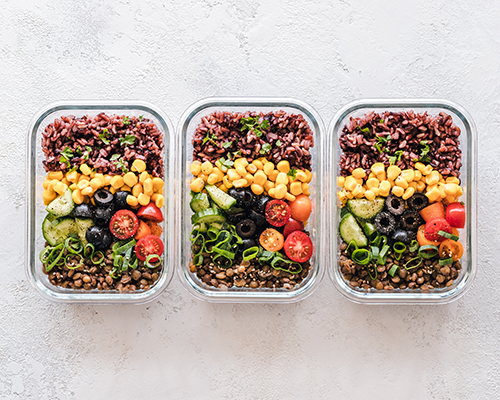Discover the Right Die: Best and worst foods for managing symptoms foods to eat and what to avoid with lupus
By Katie Gould
As dietitians, we’re often asked about different foods when facing an autoimmune condition, like lupus. While all autoimmune conditions are unique, following an anti-inflammatory eating pattern may help manage lupus by reducing inflammation in the body. In this article, we’ll break down what research supports for a healthy diet with lupus.
What is Lupus:
Lupus is an autoimmune disease that occurs when your body's immune system attacks your own tissues and organs. Basically, lupus sends the immune system into overdrive. Lupus can attack many different parts of the body like the skin, joints, or organs like your kidneys. Nutrition recommendations for lupus include an anti-inflammatory eating pattern and symptom management depending on the stage of the disease progression.
Foods to Eat:
While there is no conclusive evidence supporting a specific diet for lupus, it is still imperative to follow a healthy eating pattern. For people with lupus, aiming for a balanced diet and limiting ultra-processed foods, while reducing inflammation is key to minimizing flare ups. Foods to include are:
- Calcium Rich Foods
- People with lupus have a greater risk of osteoporosis and other bone disorders. Focus on including calcium rich foods like low-fat dairy products such as milk, yogurt, and cottage cheese, fortified orange juice, or canned fish with the bones like sardines or salmon.
- Healthy Fats
- People with lupus are at increased risk of heart disease and cardiovascular events. Aiming to incorporate healthy fats can help improve cholesterol levels, further enhancing heart health, and can help to reduce inflammation in the body. Healthy fats can be found in foods like avocados, nuts, seeds, nut butter, fatty fish, olive oil, and avocado oil.
- Whole Grains
- Adequate fiber intake has been linked to reduced inflammation in the body and improved heart health. The USDA recommends aiming for about 25 grams of fiber per day for women, while men should target about 38 grams. Fiber can be found in many whole grains like whole-wheat bread, whole grain cereals, barley, farro, quinoa, oatmeal, and brown rice.
- Fruits and vegetables
- Fruits and vegetables are high in antioxidants that can help to fight free radicals in the body, further reducing inflammation. Aim to incorporate fruits like berries, cherries, apples, grapes, and citrus fruits. Include vegetables like broccoli, peppers, mushrooms, tomatoes, and leafy greens.
- Legumes
- Research shows that beans and legumes contain bioactive compounds like polyphenols that have an anti-inflammatory effect. Any types of beans or legumes count, including soy beans, peanuts, peas, lentils, chickpeas, pinto beans, black beans, navy beans, and so many more. Try swapping one meal a week for a plant-based meal that incorporates these beans or legumes.
Foods to Avoid:
- Garlic
- Garlic can increase the activity of white blood cells in the body. For most of the population, this is a good thing to help boost immunity. However, in the case of people with lupus, this increase in the immune response is not recommended for people with lupus because their immune system is already in overdrive.
- Alfalfa Sprouts
- Alfalfa sprouts have an amino acid that has been shown to stimulate the immune response. People with lupus should avoid alfalfa sprouts due their already overactive immune system.
- Echinacea
- Echinacea is typically found as a dietary supplement used to boost the immune system. For people with lupus, this can encourage flare ups by further activating the immune response.
- Limit high sodium foods
- Limiting sodium can maintain blood pressure control, which can in turn maintain kidney health. People with lupus are at greater risk of lupus nephritis, a type of kidney disease caused by lupus. Limiting sodium may also help to preserve calcium in the body, enhancing bone health. When we eat too much sodium, calcium can be lost through the urine as the body tries to maintain the balance between calcium and sodium levels in the body. Limiting processed foods that have sodium added into them like hot dogs, deli meats, canned soups, frozen meals, and fast food.
- Limit saturated fats
- An excessive intake of saturated fats can raise cholesterol levels and increase risk of heart disease. People with lupus are 50x more likely to experience heart attack than those without lupus. Some lupus medications may also raise cholesterol or triglyceride levels, further increasing the risk of high cholesterol. Keeping the cholesterol levels within the normal range and monitoring heart health is imperative for staying healthy with lupus. Limit intake of saturated fats by choosing low fat dairy products, lean proteins like chicken, fish, or turkey, and avoiding processed foods that are high in saturated fat.
Unfortunately, there is no cure for lupus. However, following a healthy diet pattern that improves quality of life, manages symptoms, and reduces risks for flare-ups and other related side effects may greatly help with managing lupus. For more individualized recommendations, work with a registered dietitian to help develop an eating plan that works for you!
References:
- Constantin MM, Nita IE, Olteanu R, Constantin T, Bucur S, Matei C, Raducan A. Significance and impact of dietary factors on systemic lupus erythematosus pathogenesis. Exp Ther Med. 2019 Feb;17(2):1085-1090. doi: 10.3892/etm.2018.6986. Epub 2018 Nov 16. PMID: 30679978; PMCID: PMC6327661.Full text.
- Fava A, Petri M. Systemic lupus erythematosus: Diagnosis and clinical management. J Autoimmun. 2019 Jan;96:1-13. doi: 10.1016/j.jaut.2018.11.001. Epub 2018 Nov 16. PMID: 30448290; PMCID: PMC6310637. Full text.
- Lupus Foundation of America. Eating healthy when you have lupus. https://www.lupus.org/resources/diet-and-nutrition-with-lupus



